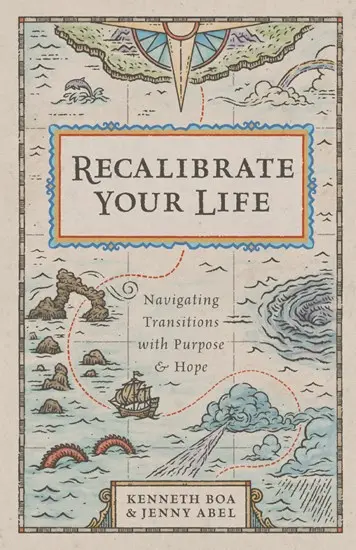Consider the pilot of a transoceanic jet, who announces to his passengers over the intercom: “I have some good news and some bad news. The good news is that we have a strong tail wind and are making great time. The bad news is that we are lost somewhere over the Atlantic Ocean, and we have no idea where we are.” It’s not likely that many of those airplane passengers would be found rejoicing at the “good” news while ignoring the bad. Yet, how many of us live our lives that way?
We need to understand our purpose in order to define success in life, to keep on track toward eternal goals, and to see the rich meaning behind the activities of our lives.
Missing the Plane of Life
How did it happen that now for the first time in his life he could see everything so clearly? Something had given him leave to live in the present. Not once in his entire life had he allowed himself to come to rest in the quiet center of himself but had forever cast himself forward from some dark past he could not remember to a future which did not exist. Not once had he been present for his life. So his life had passed like a dream. Is it possible for people to miss their lives in the same way one misses a plane? —Walker Percy, in The Second Coming
The answer to that last question is an unqualified “yes.” Many people do live their lives without having ever defined their purpose and, thus, without knowing if they achieved what they were put on earth to do. The priest and poet John Henry Newman once said, “Fear not that thy life shall come to an end, but rather that it shall never have a beginning.” Have you given any thought to the kind of life you want to have lived when you look back? Do your biggest goals line up with the life you want to have lived?
In the 1990 film Awakenings, a number of patients who had been in a catatonic state for some 30 years were temporarily brought to full consciousness through a new medication. While some were elated, others were embittered that so much of their lives had been spent in oblivion. But they all recognized and seized the preciousness of each day, especially when they learned that their “awakenings” would be only temporary.
Many people live without being truly awake, without thinking and questioning, without a sense of wonder and awe. It’s easy, even for believers in Christ, to lurch through life without ever developing a clear picture of the unique purpose for which God placed them on this planet.
Stumbling on Purpose?
In 1902 Meyer Kubelsky, a Jewish immigrant from Russia, gave his son, Benjamin, a violin for his eighth birthday. The instrument cost $50, a small fortune in those days. His son loved music and soon was playing well enough to give concerts at the Barrison Theatre in Waukegan, Illinois, the town where the Kubelskys lived. By the time Benjamin was 18, he had teamed up with a female pianist as a concert team in vaudeville.
One night as Benjamin Kubelsky was playing, he felt impelled between numbers to tell the audience about a funny incident that had happened to him during the day. “The audience laughed,” he recalled later, “and the sound intoxicated me. That laughter ended my days as a musician.” Jack Benny (as the young Kubelsky would later be called) had found his rightful career.
Most people never stumble into a career path that so happily meshes their abilities and passions. But even if the fit is perfect, a career is not the same as a biblical purpose for one’s life. Vocational setbacks and retirement don’t derail God’s purpose for us, because his intentions transcend the circumstances and seasons of our lives. Even marriage and children, as crucial as these are, cannot be equated with God’s unchanging reason for our being.
Laying hold of a sense of purpose can be a significant source of motivation, but the problem is that even as believers, we’re more inclined to pursue temporal rather than biblical purposes. In fact, most people fail to wrestle with the issue of purpose at all. But without thought-out purposes to guide us, we will base our decisions on activities and objectives that become ends in themselves. This is the antithesis of the way the Lord Jesus ordered his earthly life
A career is not the same as a biblical purpose for one’s life. . . . [God’s] intentions transcend the circumstances and seasons of our lives.
—Ken Boa
Case Studies in Purpose: Jesus and Paul
Jesus had a clear understanding of the purpose of his life, and he derived his purpose from his Father and not from his own ambitions or aspirations. The hallmark of his life was to learn his Father’s will and walk in the power of the Spirit to bring it to fruition.
The Gospels record three particularly clear purpose statements that related to our Lord’s life mission:
- “For even the Son of Man did not come to be served, but to serve, and to give His life a ransom for many.” (Mark 10:45)
- “For the Son of Man has come to seek and to save that which was lost.”(Luke 19:10)
- “I glorified You on the earth, having accomplished the work which You have given Me to do.” (John 17:4)
Jesus’ purpose was to glorify his Father by seeking, serving, and saving the lost, and testifying to the truth.
The apostle Paul also had a well-defined sense of purpose. When he met Jesus on the road to Damascus, he asked, “Who are you Lord?” (Acts 9:5). The answer to that question became the focus of his life purpose. Motivated by a passion for knowing and pleasing Christ, he remained faithful to his personal calling to evangelism and edification.
A few verses illuminate Paul’s commitment to his God-given purpose:
… that I may know Him and the power of his resurrection and the fellowship of His sufferings, being conformed to His death … I press on toward the goal for the prize of the upward call of God in Christ Jesus. (Philippians 3:10, 14)
Therefore we also have as our ambition, whether at home or absent, to be pleasing to Him. (2 Corinthians 5:9)
Run in such a way that you may win. … I run in such a way, as not without aim … but I discipline my body and make it my slave, so that, after I have preached to others, I myself will not be disqualified. (1 Corinthians 9:24b, 26–27)
And at the end of Paul’s life, he was confident that he had accomplished the mission to which God had called him:
I have fought the good fight, I have finished the course, I have kept the faith; in the future there is laid up for me the crown of righteousness, which the Lord, the righteous Judge, will award to me on that day; and not only to me, but also to all who have loved His appearing. (2 Timothy 4:7–8)
Having a clear sense of purpose is vital for living a meaningful life—the life God intends for us; but how do we develop this sense of purpose? We’ll examine the question of how to seek God’s purpose next.
Button Text



